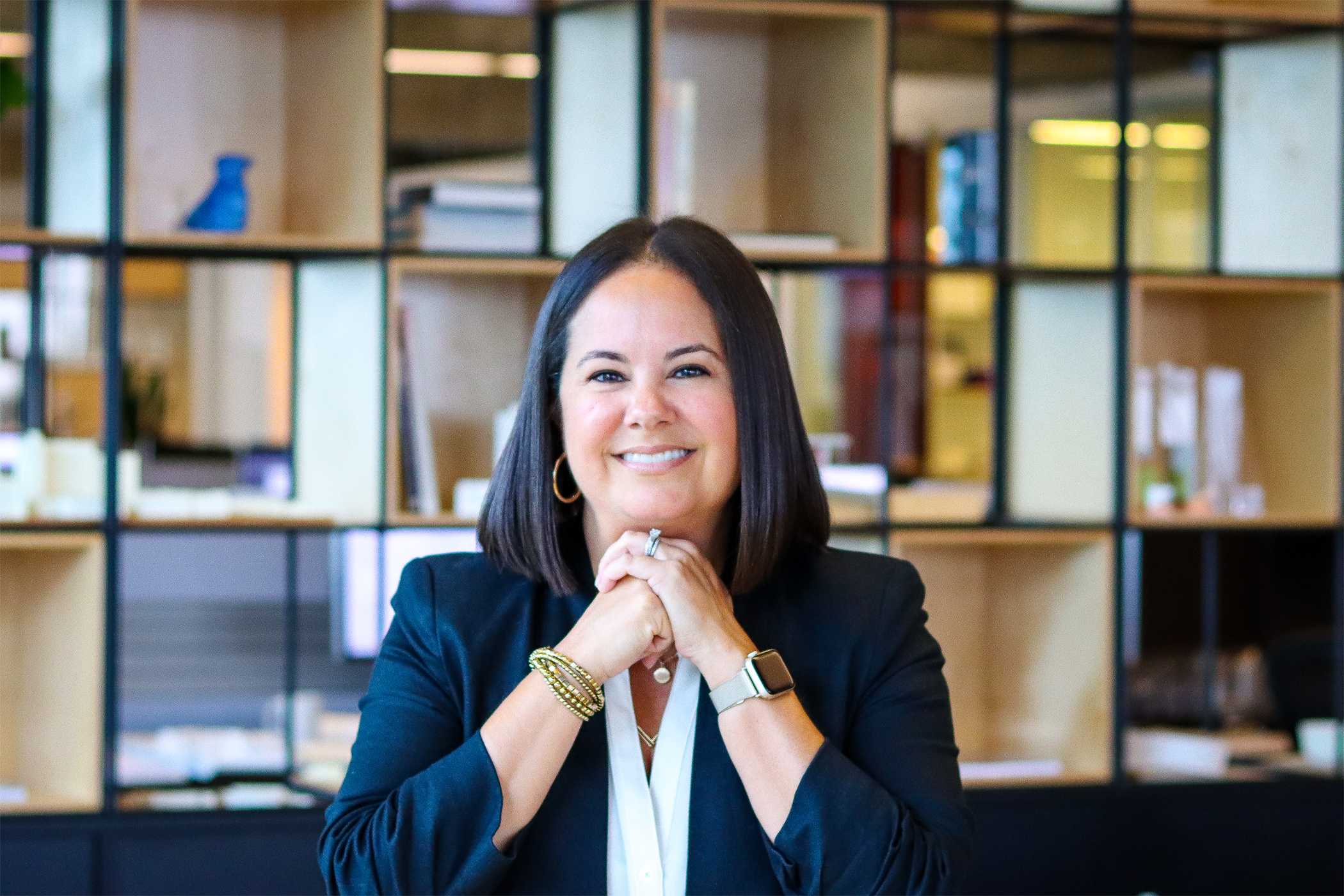Architecture's Vitality: Perkins&Will's Chief Legal Officer Joelle Jefcoat on Navigating Risk, Enabling Opportunity, and Leading Through Law
Joelle Jefcoat, FAIA, Esq. Photo courtesy of Perkins&Will.
By Julia Gamolina
Joelle Jefcoat, FAIA, Esq., is an architect, attorney, and the Chief Legal Officer for global architecture and design firm Perkins&Will. Prior to joining the firm’s legal team in 2012, for eleven years she served clients out of Perkins&Will’s Charlotte, North Carolina studio as a project architect and project manager for large, complex projects. Her experience leading higher education, K-12, and corporate and commercial projects gives her unique insight into the day-to-day issues that challenge architectural practice and project teams. In her interview with Julia Gamolina, Joelle talks about her training and what she suggests to architects, advising those just starting their careers to expand their skillset.
JG: There aren't a lot of people that I know that have both a law and an architecture degree! With your dual background, what are you thinking about the most looking ahead at the rest of 2025? What are your priorities for Perkins & Will, and for your new role?
JJ: As the new leader of Perkins&Will’s legal team, I am excited to build on the excellent legacy of my predecessor, Brodie Stephens, but also to bring my own personality and vision to the role. You’re right that there aren’t a lot of people who have both a law and architecture degree, but we’ve got five of them on our team! That’s right—all of our lawyers also have a degree in architecture. Brodie and I made it a priority to find these needles in a haystack, no matter where they are.
As a result, we have a dispersed team located in Florida, California, Ohio, and North Carolina. We each have different backgrounds and stories about how we got to where we are, but we have one big thing in common: We are uniquely specialized lawyers with a passion for architecture.
The Perkins&Will Legal Team. From left: Mike Koger, Allison Reich, Brodie Stephens, Joelle Jefcoat, Laura Jo Lieffers. Photo courtesy of Perkins&Will.
So let's go back to that for you — tell me about why you studied architecture, and how you chose where you studied architecture.
I went to high school in Palatine, IL, a northwest suburb of Chicago. Naturally, I applied to the University of Illinois because it was a very good in-state school, but I was also accepted to some other architecture schools out of state. Ultimately, my parents said they would pay for four years of in-state tuition, so I decided on U of I.
U of I gave me a very solid foundation in the beaux arts school tradition that the professors then favored. I learned about composition, balance, presentation, having a strong parti, and the importance of precedent. In my fourth year, I decided I wanted to earn my graduate professional degree. U of I offered me full tuition and a teacher’s assistant position that would cover my living expenses, but I thought it important to get a balance from a master’s program at a school with a strong approach to architectural design theory. I was thrilled to be accepted to the University of Virginia School of Architecture. The combination of degrees with differing influences and approaches has served me well in my career.
“I was determined to ensure that architects would, despite the forces of change, remain vitally important to, and legally protected in, the design and construction process. I decided to become an attorney—not to leave the profession of architecture, but to lead it.”
Tell me about your experiences working as an architect before going to law school.
I enjoyed all aspects of project design, but I gravitated early toward being a project manager. I liked having the client interaction and being involved in the project’s design and construction, start to finish. One common thread was my responsibility to negotiate contracts, make sure invoices were paid, and resolve challenges on projects. Those experiences led me to work with Brodie Stephens—then Perkins&Will’s new General Counsel and sole in-house attorney. Talking with him opened my eyes to the possibility of being in-house counsel for Perkins&Will, something I had never known was a career path.
When and how did you know a law degree would be the right next step for you?
I remember one particular conversation with another architect-attorney, Alan Fleishacker, who was helping Brodie at that time. Alan said to me, “Have you ever thought about going to law school? I think you’d make a good lawyer.” I responded that I had a great job as an architect with a mortgage to pay, so I couldn’t even think about quitting my job to go back to school. What Alan said next set the wheels in motion: “Have you considered going to law school part time at night?”
As luck would have it, a quick online search led me to discover that a new law school had opened in Charlotte just a few years prior, and it had a part-time evening program. I signed up for the LSAT and applied to that one school, figuring if it’s meant to be, it will be. And it was! I began law school just a few months later with the plan that I would join the newly forming Perkins&Will legal team when I passed the bar exam.
For the next four years, I worked full-time as an architect by day and was a law student at night. At graduation, I asked for — and received — three weeks of paid leave to study for the bar exam. I knew I had to hunker down and pass the exam on the first try; I could not risk failing and having to study all over again. I took the July bar and by September, I was Associate General Counsel for Perkins&Will.
Joelle Jefcoat and her predecessor, Brodie Stephens. Photo courtesy of Perkins&Will.
That’s a lot of work and really impressive. What have been the biggest challenges for you through all this? How did you manage through perceived disappointments or setbacks?
Years ago, I experienced major disappointment when I felt I wasn’t being recognized for a promotion on my timeline. The reality is that your firm’s timing doesn’t always align with when you want things to happen for you.
For example, when I passed the bar and moved into the legal group, I expected to be congratulated with a big raise and a leadership promotion. That didn’t happen. When I asked why, Brodie told me, “You just became a lawyer. You don’t have any experience in the law.” I felt frustrated and thought: “How could I have worked so hard to earn this law degree and not be recognized for it?” Nevertheless, I swallowed my pride and got to work, keeping the faith that I was working for a great firm that supported me.
Six years later, I found out while on maternity leave that the firmwide leadership group had unanimously supported my elevation to Associate Principal! It felt especially good to know that, while I had been out of sight for three months, I was never out of mind. Through this, I have come to appreciate that leadership comes with time, experience, and wisdom learned through patience.
What have you learned in your roles in a legal capacity at an architecture practice?
Architects are eternally optimistic. They truly believe that good design solves all problems. Unfortunately, they aren’t always strong advocates for themselves. Because they are excellent collaborators, they tend to accept responsibility rather than pause to review the history, collect the evidence, and present a defense.
“My advice to those starting their career is to be indispensable. There will be many times during your career when the future feels uncertain. Economic downturns are a reality for every generation. You need to weather those storms.”
From a legal perspective, what would you then advise young architects and your firm owners to think about and be paying attention to?
A mentor of mine used to quote the adage, “A ship is safe in harbor, but that is not what it is made for.” I think that has become the unofficial motto of the Perkins&Will legal team. My job is not to tell people to avoid all risks. My job is to help them navigate both calm and rough seas to arrive safely at their destination. That begins with understanding what the risks are and is achieved by managing them.
Architects, being the optimists that they are, may naturally prefer not to think about the risks and forge ahead, believing that just by doing a good job they will end up with a happy client and a successful project. That kind of thinking will probably result in losing money on the project at best and a dispute at the worst. Architects should use the many resources that the AIA, other professional associations, and insurance companies provide to learn more about negotiating fair and reasonable contracts, what the standard of professional care really means, and ensuring alignment between the contract terms and what the client expects with the project.
What is the impact you’d like to have on the world? What is your core mission? And, what does success in that look like to you?
My mission has always been to preserve and advance the profession of architecture for future generations. Early in my architectural career, I recognized that emerging technologies would permanently alter the way buildings are designed, documented, and constructed. I was determined to ensure that architects would, despite the forces of change, remain vitally important to, and legally protected in, the design and construction process. I decided to become an attorney—not to leave the profession of architecture, but to lead it.
Success in that mission is not what I achieve, but what the profession achieves: I want to ensure architecture’s vitality, to keep it energized with talented new architects, and to enable a boundless stream of opportunities for architects to design healthy, sustainable, beautiful buildings for generations to come. Part of that requires running healthy businesses that allow architects to earn a great living.
Giving the Keynote at the Construction Specifications Canada Conference in St. John’s Newfoundland, May 2025. Photo by Craig A. Williams Photography.
And finally, what advice do you have for those starting their career? Would your advice be any different for women?
My advice to those starting their career is to be indispensable. There will be many times during your career when the future feels uncertain. Economic downturns are a reality for every generation. You need to weather those storms.
How? Be the hardest working, most eager, collaborative, open-minded, and reliable person in your peer group. Share with your mentors and managers where you would like your career to go. Ask them for advice on how to get there. Be willing to do the hard stuff. That may include working on things you don’t love for a time, asking to gain exposure to different aspects of the practice, offering to take meeting minutes so you can attend a meeting you normally would not attend, or even seeking out specialized education or certification. The key is to be patient, but not complacent. Good things come to those who work hard, are good at what they do, and who are enjoyable to work with.
This interview has been edited and condensed for clarity.



